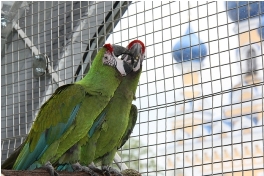-
University
21 Kosmonavtov Boulevard,
Brest, Belarus 224016Phone number:
+375 162 37‑00‑96
+375 162 21‑65‑17
Fax: +375 162 21-70-53
box@brsu.by -
Faculties
-
Education
21 Kosmonavtov Boulevard, Room 223, Brest, 224016, Belarus
Phone number: + 375 162 37-00-92
marzans@brsu.by -
Science
21 Kosmonavtov Boulevard, Brest, 224016, Belarus, Room 207
+375 162 21-66-86
nis@brsu.by
inovac@brsu.by -
International activities
21 Kosmonavtov Boulevard, Academic building № 1, Room 117, Brest, 224016, Belarus
Phone numbers: +375 162 21-06-68
+375 29 21-06-115
int@brsu.by -
Services
The University tropic greenhouse lodges macaw parrots
 The greenhouse “Winter garden” of Brest State A.S. Pushkin University has finally carried out the long-awaited project – on 19 June 2012 2 couples of South American parrots (military macaws and scarlet macaws) were placed in the roomy aviary. The birds are quite impressive, their unusual colourful feathering will leave no visitor indifferent.
The greenhouse “Winter garden” of Brest State A.S. Pushkin University has finally carried out the long-awaited project – on 19 June 2012 2 couples of South American parrots (military macaws and scarlet macaws) were placed in the roomy aviary. The birds are quite impressive, their unusual colourful feathering will leave no visitor indifferent.
The project was implemented with the aim of appropriate and balanced representation of the tropic region; as a result, the sections of the tropics and subtropics have assumed their natural looks, have become alive, being filled with the cries of their natural inhabitants – macaw parrots.
About 100 specialists from various fields as well as dozens of organizations and governmental institutions had been involved into everyday painstaking work before the greenhouse lodged the parrots. Due to the established professional ties with ornithologists and bird breeders, the agreement with the Moscow Zoo, where the progeny of macaw parrots was received several times already, was reached. With the assistance of the director of the Moscow Zoo V.V.Spitsyn, as well as Candidate of political sciences, chief adviser of the Executive Office of the President of the Russian Federation G.A.Korsunov, who is besides all an eager visitor of the University greenhouse, the Winter garden was presented with 2 couples of macaw parrots and 10 peach-faced lovebirds.
The parrots need to be constantly observed by a specialist while the contacts with people should be reduced due to the housing conditions change. The birds are placed in quarantine with the aim of their complete adaptation and rehabilitation, that’s why the visitors’ access to the birds is temporarily restricted.
It is worth mentioning that military macaws and scarlet macaws are among 17 species of these parrots inhabiting our planet these days. Both species can be found in The Red Book.
Now the visitors of the Winter garden have a unique opportunity to have a look at such rare birds (these species of parrots can be hardly found in the zoos of the republic), to observe their funny and at times smart behaviour amid the tropic vegetation, to become an eye-witness of the feeding process and of the process of communication between the birds and the keeper, as well as to get consultations on the peculiarities of keeping parrots in captivity.
L.L.Komolova, B.I.Shokalo








